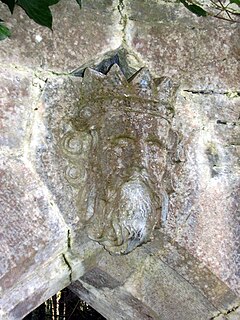Muiredach (Old Irish), Muireadhach or Muireach, anglicized variously to Murdoch , Murtagh, Murray, Murdac, Mordacq and other forms, is a Goidelic name (meaning "chieftain") popular in Scotland and Ireland in the Middle Ages:

Connacht, or Connaught, is one of the provinces of Ireland, in the west of Ireland. Until the ninth century it consisted of several independent major Gaelic kingdoms.
There have been four Provinces of Ireland: Connacht, Leinster, Munster, and Ulster. The Irish word for this territorial division, cúige, meaning "fifth part", suggests that there were once five, and at times Meath has been considered to be the fifth province; in the medieval period, however, there were often more than five. The number of provinces and their delimitation fluctuated until 1610, when they were permanently set by the English administration of James I. The provinces of Ireland no longer serve administrative or political purposes but function as historical and cultural entities.
Hugh may refer to:
The Earl of Fife or Mormaer of Fife was the ruler of the province of Fife in medieval Scotland, which encompassed the modern counties of Fife and Kinross. Due to their royal ancestry, the earls of Fife were the highest ranking nobles in the realm, and had the right to crown the king of Scots.

Ruaidrí mac Tairrdelbach Ua Conchobair was King of Connacht from 1156 to 1186, and High King of Ireland from 1166 to 1198. He was the last High King of Ireland. Anglo-Normans invaded Ireland. Ruaidrí was the last native and Gaelic King of Ireland.

O'Flaherty, is an Irish Gaelic clan based most prominently in what is today County Galway. The clan name originated in the 10th century as a derivative of its founder Flaithbheartach mac Eimhin. They descend in the paternal line from the Connachta's Uí Briúin Seóla. They were originally kings of Maigh Seóla and Muintir Murchada and as members of the Uí Briúin were kinsmen of the Ó Conchubhair and Mac Diarmada amongst others. After their king Cathal mac Tigernán lost out to Áed in Gai Bernaig in the 11th century, the family were pushed further west to Iar Connacht, a territory associated with Connemara today. They continued to rule this land until the 16th century. The name has been alternatively rendered into English in various forms, such as Flaherty, Faherty, Laverty, Flaverty, Lahiff, and Flahive.

The Ó Dálaigh were a learned Irish bardic family who first came to prominence early in the 12th century, when Cú Connacht Ó Dálaigh was described as "The first Ollamh of poetry in all Ireland".
Bardic poetry is the writings produced by a class of poets trained in the bardic schools of Ireland and the Gaelic parts of Scotland, as they existed down to about the middle of the 17th century or, in Scotland, the early 18th century. Most of the texts preserved are in Middle Irish or in early Modern Irish, however, even though the manuscripts were very plentiful, very few have been published. It is considered a period of great literary stability due to the formalised literary language that changed very little.

Aodh is an Irish and Scottish Gaelic male given name, originally meaning "fire". Feminine forms of the name include Aodhnait and Aodhamair. It appears in even more variants as a surname. As a surname, the root or a variant may be prefixed by O, Ó, or Ui, Mac or Mc, or Nic.
Muiredach Muinderg mac Forggo was a king of Ulaid from the Dál Fiatach. He was the son of Forgg mac Dalláin. His sobriquet means red-necked.
Finsnechta Cethardec mac Cellaig was a King of Leinster of the Uí Dúnchada sept of the Uí Dúnlainge branch of the Laigin. He was the son of Cellach mac Dúnchada, a previous king. He ruled from 795 to 808. His byname Cethardec meant "four-eyes".
Events from the 7th century in Ireland.
Muiredach mac Brain was a King of Leinster of the Uí Muiredaig sept of the Uí Dúnlainge branch of the Laigin. This sept had their royal seat at Maistiu (Mullaghmast) in South Kildare. He was the son of Bran Ardchenn mac Muiredaig, a previous king. He ruled from 805 to 806 and again from 808 to 818.
Muiredach mac Ruadrach was a King of Leinster of the Uí Fáeláin sept of the Uí Dúnlainge branch of the Laigin. This sept had their royal seat at Naas in the eastern part of the Liffey plain, Airthir Liphi. He was the son of Ruaidrí mac Fáeláin, a previous king. He ruled from 805-806 and again from 808-829.
Máel Ísu, Maol Íosa or Máel Íosa, meaning devotee of Jesus, Latinised as Malise, may refer to:
Events from the 9th century in Ireland.
Muireadhach Ua Dubhthaigh was an Archbishop of Connacht, in Ireland.
Murchadh is masculine given name in the Irish and Scottish Gaelic languages.
Mor Ní Briain was Queen of Connacht, and died 1218. She was a daughter of King Domnall Mór Ua Briain of Thomond. Domnall's wife was Órlaith Ní Murchadha, Princess of Leinster, daughter of Queen Mor Ui Thuathail and King Diarmaid Mac Murchadha of Leinster.